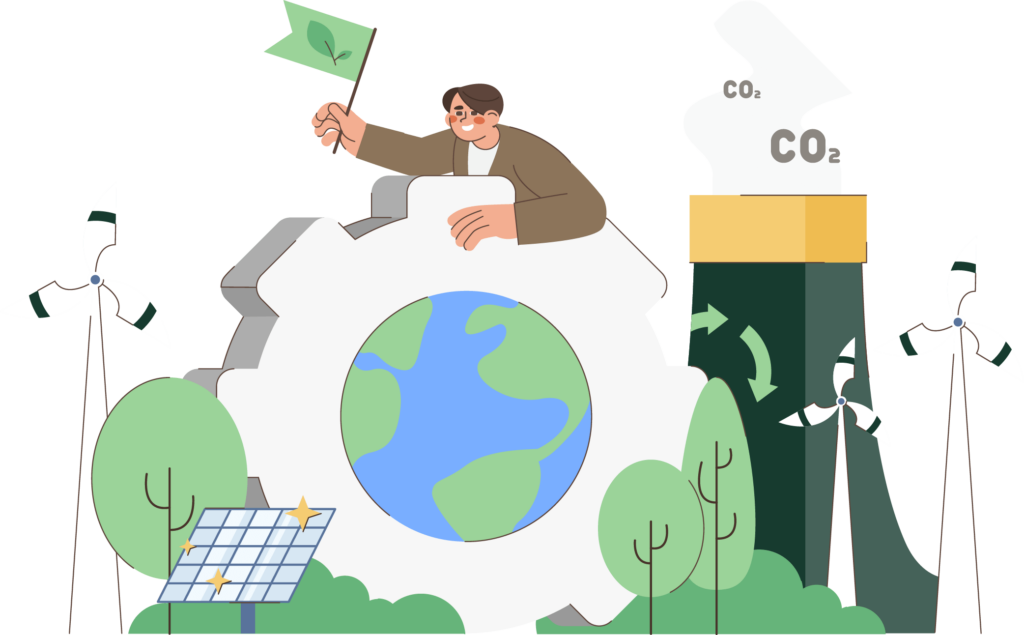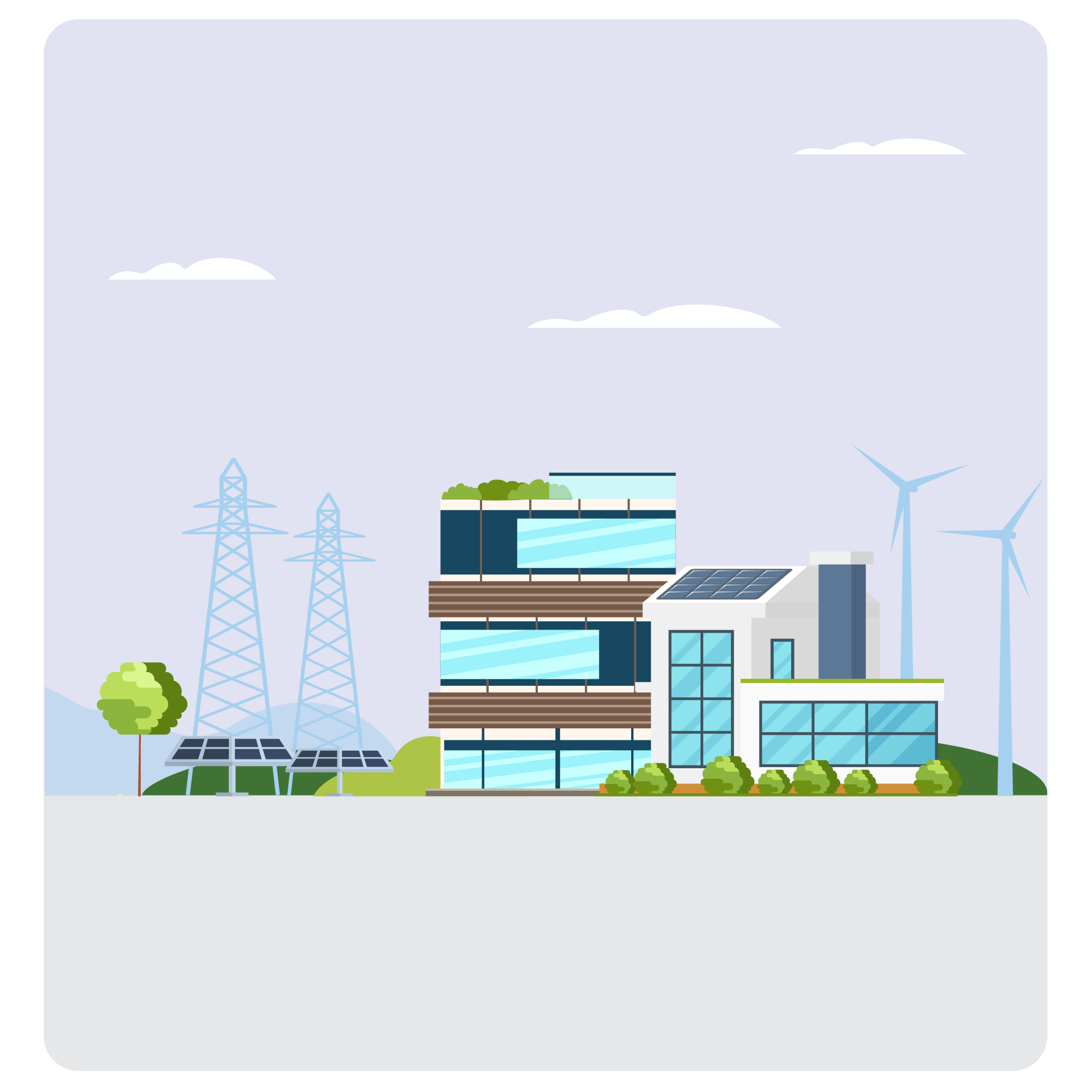Goal 1
Driving Carbon Reduction Across Our Portfolios and Cities
Sunway’s Net Zero Carbon Emissions by 2050 Roadmap
On Track Towards Achieving 2030 Targets
We have set future value goals and 2030 targets to drive carbon reduction across our portfolios and cities.
Decarbonisation
Resource management
Pollution management
2030 — 2050
Implementation:
- Carbon capture and storage
- Investment in large-scale renewable energy

Climate Report: Net Zero by 2050
We have been disclosing our climate report, including Value at Risk disclosures, according to the TCFD recommendations since 2021. In 2024, we further assessed and aligned our climate risks and opportunities with IFRS S2.
Climate Report: Net Zero by 2050
CO2e emissions inventory in 2024
Carbon sequestrated from 274,242 trees planted in Sunway townships
Total CO2e Emissions and
Total CO2e Emissions Avoidance In 2024
Scope 1, 2 And 3

Company Vehicles
Company Vehicles
+2,976 Tonnes
Company Facility
Company Facility
+118,594 Tonnes
Scope 1:
Direct Emissions

Purchased Electricity
Purchased Electricity
(National Grid)
+218,546 Tonnes
Renewable Electricity
Renewable Energy
-11,449 Tonnes
Scope 2:
Indirect Emissions

Category 1: Purchased goods and services
Category 1:
Purchased goods
and services
-2,317 Tonnes
Category 5: Waste Diverted
Category 5:
Waste Diverted
-1,425 Tonnes
Category 5: Waste Generated in Operations
Category 5:
Waste Generated
in Operations
+10,135 Tonnes
Category 6: Business Travel
Category 6:
Business Travel
+2,229 Tonnes
Category 7: Employee Commuting
Category 7:
Employee Commuting
+11,862 Tonnes
Category 13: Downstream Leased Assets
Category 13:
Downstream Leased Assets
+132,060 Tonnes
Scope 3:
Indirect Emissions
- CO2e emissions
- CO2e emissions avoidance
Greening Our Cities and Townships
- Embeds sustainable practices into the development, operations and management, starting from the conceptualisation process to the design, construction, operation and maintenance of buildings and infrastructure
- Guides the Group to design and produce built environment that facilitates healthy lifestyles and emphasises communal well-being
- Incorporates sustainable practices into the development, operations and management, including during the conceptualisation, designing, construction, operation and maintenance of buildings
- Guides the Group to design and produce built environments that promote healthy lifestyles and support the well-being of stakeholders
- Complies with all applicable environmental legislation and obligations imposed by the authorities
- Incorporates biodiversity considerations into internal strategic and decision-making processes, including the analysis, management and reporting of long-term risks
- Applies the principle of mitigation hierarchy (avoid, minimise, restore and compensate as a last resort) to manage negative impacts across all stages of our businesses and projects
- Promotes the avoidance or reduction of deforestation arising from our activities and supply chain
- Promotes the preservation of natural water bodies to act as retention ponds for flood mitigation and maintaining aquatic ecosystems
- Promotes energy efficiency and renewable energy usage, reducing reliance on fossil fuels
- Commits to an internal carbon pricing framework that incentivises businesses to generate renewable energy and penalises them for surpassing emission intensity thresholds
- Promotes the engagement with vendors, suppliers, tenants and other stakeholders on lowering Scope 3 emissions
- Commits to being guided by an embodied carbon roadmap to minimise the negative environmental footprint of our products
- Commits to considering climate-related risks and opportunities when acquiring new assets
- Embeds sustainable practices into the development, operations and management, starting from the conceptualisation process to the design, construction, operation and maintenance of buildings and infrastructure
- Guides the Group to design and produce built environment that facilitates healthy lifestyles and emphasises communal well-being
- Incorporates sustainable practices into the development, operations and management, including during the conceptualisation, designing, construction, operation and maintenance of buildings
- Guides the Group to design and produce built environments that promote healthy lifestyles and support the well-being of stakeholders
- Complies with all applicable environmental legislation and obligations imposed by the authorities
- Incorporates biodiversity considerations into internal strategic and decision-making processes, including the analysis, management and reporting of long-term risks
- Applies the principle of mitigation hierarchy (avoid, minimise, restore and compensate as a last resort) to manage negative impacts across all stages of our businesses and projects
- Promotes the avoidance or reduction of deforestation arising from our activities and supply chain
- Promotes the preservation of natural water bodies to act as retention ponds for flood mitigation and maintaining aquatic ecosystems
- Promotes energy efficiency and renewable energy usage, reducing reliance on fossil fuels
- Commits to an internal carbon pricing framework that incentivises businesses to generate renewable energy and penalises them for surpassing emission intensity thresholds
- Promotes the engagement with vendors, suppliers, tenants and other stakeholders on lowering Scope 3 emissions
- Commits to being guided by an eembodied carbon roadmap to minimise the negative environmental footprint of our products
- Commits to considering climate-related risks and opportunities when acquiring new assets
Environmental Performance Data
Our approach to lowering our greenhouse gas emissions is underpinned by efficient energy management and transitioning from fossil fuel to renewable energy.
Efficient energy management and shifting from fossil fuel to renewable energy play a key role in reducing the Group’s GHG emissions.
Note:
Data represents 2024’s generation
Water is an important natural resource for our business operations. To optimise water consumption and preserve this natural resource, we continue to utilise alternative sources such as rainwater and lake water for non-essential activities.
Note:
Data represents 2024’s generation
Efficient waste management is a crucial part of our environmental management. Guided by the principles of a waste management hierarchy, we prioritise waste prevention and treat responsible disposal as the last resort to minimise waste generation and waste to landfill.
Scheduled Waste:
Construction /Industrial Waste:
Note:
Data represents 2024’s generation

